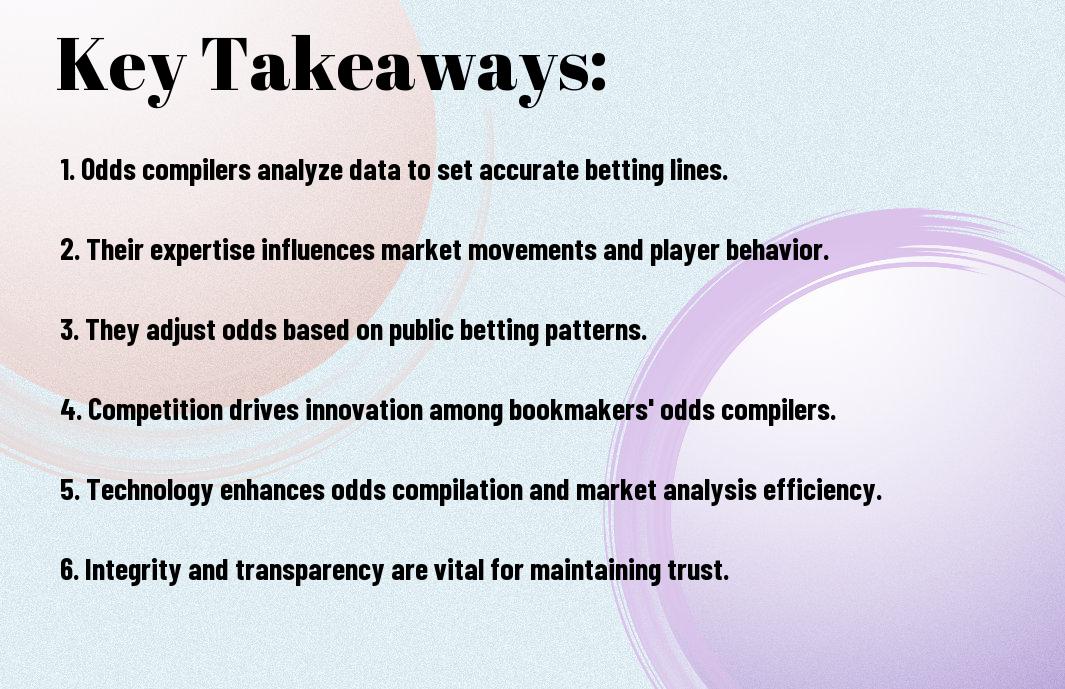As you research into the world of sports betting, you’ll notice that odds play a significant role in shaping your decisions. But have you ever wondered who is behind these numbers? You can learn more about the professionals responsible for setting them by checking out a Career Guide: Odds Compiler, which outlines the skills and expertise required for this role. Your understanding of betting markets will become clearer as you explore the impact of odds compilers on the industry.
Key Takeaways:
- The odds compilers play a significant role in shaping betting markets by setting the initial prices for various events, which in turn influence the betting public’s perception of the likelihood of different outcomes.
- Odds compilers use a combination of statistical models, expert opinion, and market analysis to determine the probability of different events, and their decisions can have a major impact on the betting market.
- The compilers’ odds can affect the overall liquidity of the market, as bettors are more likely to place bets on events with attractive odds, and bookmakers may adjust their odds in response to changes in the market.
- The role of odds compilers is not limited to setting initial prices, as they also continuously monitor the market and adjust the odds in real-time to reflect changing circumstances, such as injuries, weather conditions, or other factors that may impact the outcome of an event.
- Effective odds compilers must balance the need to attract bettors with the need to manage risk, as setting odds that are too favorable to bettors can result in significant losses for the bookmaker, while odds that are too unfavorable can drive bettors away from the market.

Core Functions of Odds Compilers
Before entering into the specifics, you should understand that odds compilers play a vital role in shaping betting markets by setting accurate and competitive odds, which in turn affects the overall betting experience for you as a bettor.
Mathematical Modeling and Probability Assessment
Against the backdrop of complex data analysis, you will find that odds compilers utilize advanced mathematical models to assess probabilities and set initial odds, allowing you to make informed betting decisions based on their calculations.
Market Analysis and Price Setting
At the heart of an odds compiler’s job is the ability to analyze market trends and set prices that balance risk and potential profit, enabling you to place bets with confidence in the fairness of the odds.
For instance, when you consider the process of market analysis and price setting, you will notice that odds compilers must take into account various factors, including team performance, player injuries, and external conditions, to set prices that reflect the true likelihood of an outcome, thereby giving you a fair chance to win while also ensuring the bookmaker’s profitability.
Market Impact and Influence
One of the key aspects of odds compilers is their ability to shape betting markets, and you will notice that their influence is significant in determining the odds and prices of various events. As you investigate deeper into the world of betting, you will understand how odds compilers play a vital role in creating a balanced market.
Price Movement and Market Efficiency
Influencing the market with their odds, you see that compilers have a significant impact on price movement, which in turn affects market efficiency, and you should consider how this impacts your betting strategy.
Balancing Book Risk Management
Among the various tasks of odds compilers, managing risk is vital, and you will find that they strive to balance their books to minimize losses, which is something you should be aware of when making your bets.
In fact, as you explore the concept of balancing book risk management further, you will discover that odds compilers use various techniques to manage their risk, including adjusting odds, setting limits, and hedging, all of which are designed to protect their books and ensure a profitable outcome, and it’s vital for you to understand these strategies to make informed betting decisions.
Technical Tools and Systems
All odds compilers rely on advanced technical tools and systems to analyze data, identify trends, and set accurate odds. You will find that these tools are vital in shaping betting markets and providing a competitive edge.
Statistical Analysis Software
Around the world, odds compilers utilize specialized software to analyze statistical data, enabling you to make informed decisions when setting odds and managing risk.
Real-time Data Processing
The ability to process data in real-time is vital for odds compilers, allowing you to respond quickly to changing circumstances and stay ahead of the competition.
Systems that facilitate real-time data processing enable you to analyze large amounts of data rapidly, identifying patterns and trends that inform your decision-making and help you optimize your odds, giving you a competitive advantage in the betting market.

Risk Management Strategies
Once again, you will find that odds compilers play a significant role in shaping betting markets through their risk management strategies, which help you minimize losses and maximize gains.
Exposure Limitation Methods
Adeptly, you can manage your risk by implementing exposure limitation methods, which enable you to set limits on your bets and avoid excessive exposure to potential losses.
Portfolio Diversification Techniques
By diversifying your portfolio, you can spread your risk across different markets and bets, reducing your overall exposure to potential losses and increasing your chances of winning.
Strategies such as hedging and arbitrage can be used to further diversify your portfolio, allowing you to capitalize on differences in odds across different markets and minimize your risk, thereby giving you more control over your betting experience and helping you make informed decisions.
Market Competition Dynamics
After analyzing the role of odds compilers, you will notice that their work significantly influences the betting markets. You can see how their decisions impact the odds and, consequently, the betting public’s behavior.
Competitor Analysis
Among the various factors that odds compilers consider, competitor analysis stands out as a key aspect. You will find that understanding what your competitors are offering helps you make informed decisions about your own odds and betting options.
Price Differentiation Strategies
Against the backdrop of intense competition, you will need to develop effective price differentiation strategies. You can achieve this by offering unique odds or promotions that set your platform apart from others.
Due to the ever-changing nature of betting markets, your price differentiation strategies must be adaptable. You will need to continuously monitor your competitors and adjust your strategies accordingly, ensuring that your platform remains competitive and attractive to bettors. This may involve offering specialized bets, enhanced odds, or other incentives that cater to specific segments of the betting market, allowing you to maintain a strong position within the industry.
Evolution of the Role
Keep in mind that the role of odds compilers has undergone significant changes over the years, adapting to the shifting landscape of the betting industry. You will notice that their responsibilities have expanded to include more complex data analysis and market monitoring.
Traditional vs Modern Methods
After examining the historical context, you can see that traditional methods of odds compilation have given way to more modern approaches, incorporating advanced statistical models and real-time data feeds, allowing you to make more informed decisions.
Technology Integration
Alongside the development of new tools, you are now able to leverage technology to streamline your odds compilation processes, enabling faster and more accurate calculations, which in turn, allows you to respond quickly to changing market conditions.
Evolution of technology has led to the creation of sophisticated software that can process vast amounts of data, providing you with detailed insights into market trends and patterns, enabling you to refine your odds compilation strategies and gain a competitive edge in the betting market, allowing you to make more precise decisions and maximize your returns.
Conclusion
Drawing together the various threads, you can see that odds compilers play a significant role in shaping betting markets. As you consider placing a bet, your understanding of their methods and influences can inform your decisions. By recognizing the factors that affect odds compilation, you can make more informed choices and navigate the markets with greater confidence, ultimately enhancing your overall betting experience. Your awareness of these dynamics will serve you well in the complex world of sports betting.
FAQ
Q: What is the primary function of odds compilers in the betting industry?
A: Odds compilers play a vital role in shaping betting markets by setting the initial odds for various events. They use a combination of statistical models, data analysis, and expert knowledge to determine the likelihood of different outcomes, thereby influencing the prices offered to bettors. Their primary function is to balance the book, ensuring that the betting operator generates a profit regardless of the outcome, while also providing competitive odds to attract customers.
Q: How do odds compilers incorporate data and analytics into their decision-making process?
A: Odds compilers rely heavily on data and analytics to inform their decisions. They analyze historical data, team and player performance, weather conditions, and other relevant factors to assess the probability of different outcomes. They also use advanced statistical models, such as machine learning algorithms, to identify trends and patterns that may impact the outcome of an event. Additionally, they monitor real-time data, such as in-game statistics and betting patterns, to adjust odds accordingly and maintain a balanced book.
Q: What impact do odds compilers have on the overall betting market, and how do they influence betting behavior?
A: Odds compilers have a significant impact on the overall betting market, as their odds can influence betting behavior and shape market trends. By setting competitive odds, they can attract customers and drive betting volume, which in turn can impact the overall market. Moreover, their odds can also influence the perception of an event’s outcome, with lower odds often indicating a favorite and higher odds indicating an underdog. This can lead to a self-fulfilling prophecy, where bettors are more likely to back the favorite, further driving down the odds and reinforcing the initial assessment. As such, odds compilers play a key role in shaping the betting market and influencing the decisions of bettors.




